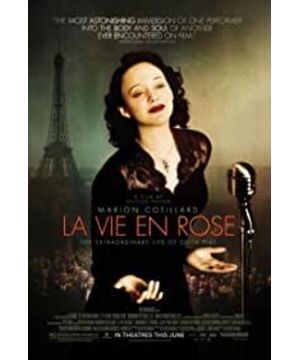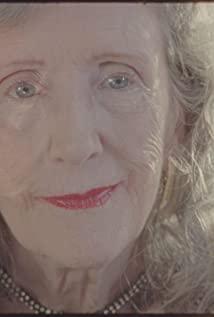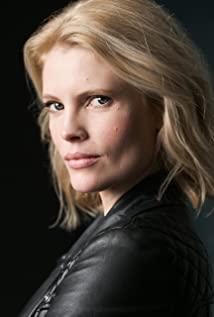, if Edith Piaf, the soul of the late French chanson, had a true character, style, and life as shown in the film "Life of a Rose" If so, then she is not the type of woman I admire the most. However, this does not prevent me from appreciating her wonderful singing, nor does it prevent my respect for her suffering life.
It is undeniable that the filming of this film is not bad, especially the performance of the leading actor Marion Goliath and the comprehensive use of language and editing skills in the ending part of the film. The way of reproduction is just right to send out the emotions and content to be expressed, and it interprets the legendary life of Edith Piaf exquisitely and accurately. You may not appreciate her style, but you will definitely applaud her at the end. tears.
The first half of the film seems trivial and mixed, especially the narrative style of "moving from far and near" - the random jumps and crosses between the indistinct main narrative and the chronological interlude, at first glance, it seems a bit out of order, It's a little messy. After gradually understanding the plot and expression, the audience will understand that this way of presentation of the film is completely based on an "old man" (actually not old, Piaf was only 47 years old when he died, but due to long-term "wasteful" "My own body is already described as withered) and the patient's scattered memories are carried out. A person who is not long in the world will often be touched by the situation and remember things because of things. This way of thinking is jumping and has no time and space restrictions, so I will look back for a while. From childhood, you can quickly jump to old age in a while, and in a flash, it is a flourishing age, but the theme to be expressed remains the same: the ill-fated, rough, intense and legendary life of the French queen.
Edith Piaf once said: "Without love, we are nothing." In her formative years, she was the epitome of lack of love. Edith Biaf, formerly known as Edith Giovana Garson, was born in Paris in 1915 to a family of wandering entertainers. Her father was a circus performer before enlisting in the army, and her mother was a street singer. When Edith was young, her father joined the army, and her mother left her for her grandmother when she left for a better development. Her father took the opportunity of visiting relatives and sent her to Normandy to live with her grandmother. The grandmother is the mother of a brothel, and she is not particularly concerned about her granddaughter, but the kind prostitute Titini selflessly gave little Edith motherly care and singing enlightenment, which is a rare happiness in Edith's life. Time, although the environment is not suitable for children to grow up. Titini took good care of little Edith, who suddenly suffered from keratitis, and took her to pray devoutly. Little Edith finally regained her sight. After that, Edith developed the habit of praying devoutly.
After the war, Edith was taken to the circus by her father. There were no idlers in the circus. Her father urged her to do rough work when she was young. After that, my father started to go it alone and took Edith to perform in various places in France. At this time, Edith's singing talent was discovered and she started a street singing career.
At the age of 15, Edith (played by Marion Cotillard), who sings on the streets of Paris, not only has to support her grumpy father who has nothing to do, but also gives money to her grumpy mother, who is struggling to resist greed. When her father forces her to sell, she is discovered by Louis Ripley (played by Depardieu), the owner of an upscale Paris café, who signs Edith and gives her the stage name "Little Sparrow". , and support her. But Edith Biaf was unlucky. Before she could live a stable life for a few days, before she woke up from the feasting and feasting, Ripley was stabbed to death, and her life slipped into a trough again. Luckily, an admirer of her voice, author and poet Raymond Esso (Mark Barbey), doesn't want to see the pearl buried, so he steps up to help Biave out of trouble and for her. Corrected the bottom-level pronunciation and the emotionless singing style that could not enter the high-end concert hall, and created the first good song for her that is worth keeping. The shape of the black dress without a collar is also Raymond Esso for Bi Established by Yaf.
With the help and help of friends, Edith Biaf became popular. Her charming voice conquered Paris and the whole of France. She released records, entered the film industry, and even appeared on the stage of theatrical work. In 1947, Beave went to the United States to sing, which was not smooth at first, but she still achieved great success and became friends with the movie star Marlene Dietrich. Meanwhile, she falls in love with boxing champion Marcel Sandin (played by Pierre Martins), but bad luck strikes again, with Sandin dying in a plane crash in 1949.
When Bi Yafu overcame her grief and returned to the stage again, bad luck was still with her. In just a few months, she suffered two accidents. During the treatment, she became addicted to drugs and alcohol. After that, her health deteriorated and she even fainted suddenly during the performance. She loves the stage and wants to go on stage again even on morphine. But she doesn't cherish life, she doesn't care about health at all, she drinks too much and is overly dependent on morphine... In 1963, 47-year-old Edith Biaf died of liver cancer.
Edith Biaf has a flamboyant personality, self-centered, willful and stubborn, and sometimes domineering. She likes to go to extremes, and she will get drunk when she drinks; lipstick must be bright red, she likes to laugh , can also cry, and is more suitable for talking loudly and vulgarly, even though she is only 1.47 meters tall, her temper is amazing, even a little neurotic. She was always on her back, with her hands on her hips, and scolding those around her. As her health deteriorated, she became more and more stooped, especially in the last few years of her life, when she was hunched over like an old man and struggled to walk.
Sometimes, character determines fate, and character determines the way a person behaves in the world. It can be said that Edith Biaf's emotional intelligence is not high and cannot be compared with her singing skills. Learn to protect herself, she is more willing to do whatever she wants, even the opposite, and sometimes she acts too emotionally and recklessly. She can make the band wait for her for 3 hours, or she can let the person who invited her to dinner wait in vain, or because of a song. Adopted, and suddenly decided to reopen the concert that was just announced to be cancelled. Before she fell in love with boxing champion Marcel Sandan, she knew that Sandan had a wife and three children, but she let her feelings run wild, so this hurtful emotional drama eventually hurt herself, and Sandan's death Almost made her insane. It seems that the ill-fated fate and the hardships of life have made Edith Biaf's character increasingly approaching a crater-like extreme.
Another element of the film that connects the whole film is Bi Yafu's songs, which are not used strictly according to the creation period, but are interspersed according to the development and changes of the plot and the inner world of the protagonist. It highlights two songs, "La Vie En Rose" and "Non, je ne regrette rien (I have no regrets)", which appeared during her love affair with Sandin and for the last time at the Olympia Music in Paris. performance in the hall.
"La Vie En Rose (Rose Life)" has become one of her most widely sung songs since it came out and Beave first sang it. Louis Armstrong sang this song on the trumpet, Canadian diva Celine Dion's version, Japanese singer Ono Lisa's French version, etc. Putting "La Vie En Rose" in the love scene perfectly expresses Bi Yafu's attitude towards love, "...give you my heart and spirit, forever..." Since love, we must be firm Devoted and intense, this is Bi Yafu's character.
At the end of the film, when Bi Yafu's life is approaching the end, multiple sets of scenes are edited and alternated: the singing of the last concert, the reporter's interview, the dying scene, Bi Yafu's father, about her short-lived daughter when she was young Memories... All these shots, combined with the dialogue and the song "Nonje ne regrette rien (I have no regrets)", present Biaf's life precisely and appropriately, and also annotate her characteristics: "No, no Just no. No, I have no regrets. Good or bad, I accept it, bad or bad, I don't care... I ignited the fire with my memories, my grief, my happiness, I don't need it anymore, I Starting from scratch again..." The old friends in the concert hall who knew Bi Yafu's history shed tears when they heard it, and the audience couldn't help crying when they saw this.
Interspersed at the same time, the question and answer by the reporter and Bi Yafu at the seaside before her death seems to have a long meaning -
Reporter: Are you willing to live a plain life?
Beave: That's what happened.
Reporter: Who is your most loyal friend?
Beave: My real friends are loyal.
Reporter: In case you can't sing anymore...
Bi Yafu: I can't live anymore.
Reporter: Are you afraid of death?
Bi Yafu: I will be afraid of loneliness.
Reporter: Do you pray?
Beave: Yes, because I believe in love.
Reporter: The most beautiful time of my career...
Beave: Every time the curtain rises.
Reporter: The most beautiful memory as a woman...
Beave: The first kiss.
Reporter: Do you like the dark night?
Bi Yafu: I like it, but with bright lights.
Reporter: What about Dawn?
Bi Yafu: You have to have a piano and friends by your side.
Reporter: What about at night?
Biaf: It's dawn for us.
Reporter: What advice do you have for other women?
Beave: Love.
Reporter: What advice do you have for girls?
Beave: Love.
Reporter: What about children?
Beave: Love.
(To listen to Bi Yafu's version of "La Vie En Rose", go to http://nicolew.blog.hexun.com/12755039_d.html )
View more about La Vie En Rose reviews











